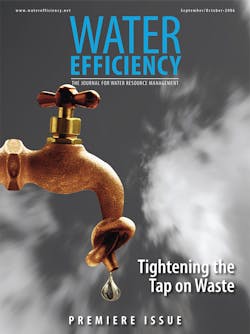Editor's Comments: Angela Godwin
WELCOME TO THE November/December edition—and final installment—of Water Efficiency. As the calendar year draws to a close and we prepare for an exciting new year ahead, all of us at Endeavor Business Media wish to thank you for the time you've spent among the pages of Water Efficiency. Whether you are a new reader or a 14-year veteran, your support is warmly acknowledged and appreciated.
Just because it's our last edition doesn't mean it's our least; we have lots of great content lined up for you in this issue! Kicking off our feature selections this month is a look at the 30-year progression of water reuse in Colorado. In the 1980s, forward-looking pioneers in Denver anticipated the future need to augment water supplies and implemented a 1-MGD potable water reuse pilot system using secondary effluent from a regional water reclamation facility. They tested and validated treatment processes that would achieve their potable water quality goals—but at the time, there was no need to go any further. Thirty years later, facing a possible water shortage of 560,000 acre-feet by 2050, a coalition of Colorado water providers and industry members conducted another DPR demonstration, building on the groundbreaking work from the 1980s. Click here for the whole story.
You may be familiar with the EPA's WaterSense program, but did you know that it has reduced water usage in the U.S. by 3.4 trillion gallons since its inception in 2006? In this feature article, learn about some of the amazing work being done around the country to encourage water conservation. Here, author Beth Livingston highlights many of the award-winning programs that best capture the water-saving spirit of the WaterSense program.
Imagine if you could predict where your next pipe break would happen. Doug Hatler discusses how machine learning and artificial intelligence are supporting a new way of aligning maintenance, repair, and replacement strategies. With it, he says, utilities can assess the condition of drinking water mains to help them better assess pipe replacement decisions and allocate funding.
Membranes are a big investment and, as such, care must be taken to protect them from breakage. Del Williams explains how prefiltration can protect and extend the life of membrane systems, as well as increase intervals between backwashing or necessary maintenance.
Back in 2004, water control gates at the W.B. Casey Water Resource Recovery Facility were installed and operated flawlessly for over a decade. But in 2015, damage in the facility's pipeline rendered the gates inoperable. Facility staff were sure the gates would need to be repaired or replaced, but they were surprised at what they found during inspection. Click here to read more.
As buried pipes age, the incidence of leaks and water main breaks escalates, resulting in disruption, water loss, and costly repairs. Chad Atcheson explains how the use of spray-in-place pipe rehabilitation provides an alternative to traditional methods, offering a new tool to extend the life of existing pipes.
Leaks in plumbing systems can cost school districts thousands of dollars a year and cause potentially long-term damage to building infrastructure. But, as Fadi Kiameh explains, school districts can create a learning environment that is on the cutting edge of both education and environmental efficiency by investing in water conservation solutions. The Trenton (Tenn.) Special School District is a great example, and it used an energy performance contract to offset the cost of the project.
We hope you enjoy this final edition of Water Efficiency. We bid you a fond farewell and thank you for reading!
